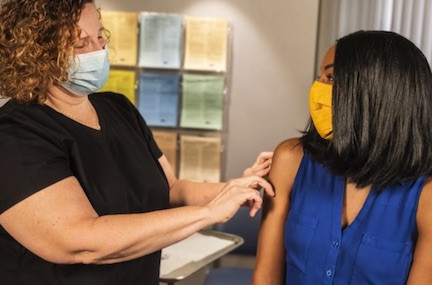After almost
11 months of research and billions of dollars invested, vaccines designed to
protect people against one of the most serious health threats in a century are starting
to enter the healthcare market. On December 11, the FDA issued its first
emergency use authorization to Pfizer’s COVID-19 vaccine, with Moderna’s
vaccine approved on December 18th. That same week, the U.K. began
immunizations, and 90-year-old
Margaret Keenan received the first shot in a hospital in Coventry, England.
Who's First in Line for a COVID-19 Vaccine? Greenwall Faculty Scholars Examine Urgent Ethical Issues in Vaccine Allocation

But at the heart of these pandemic milestones there remain serious ethical dilemmas about how to allocate and distribute the new vaccines. With so many people needing the vaccine, who gets it first? Who gets it last? More than practical considerations, these questions – and how decision-makers answer them – will have life and death implications.
Greenwall Faculty Scholars have been working on the bioethics issues that surround vaccine distribution from the start of the pandemic. Their thinking on prioritizing immunization is more critical than ever as vaccines are approved and rolled out to millions of people around the world. We have gathered a selection of the recent work produced by Greenwall Faculty Scholars which introduces some of the most important questions on vaccine distribution:
- Greenwall Faculty Scholar Govind Persad, JD, PhD coauthored a paper in Science outlining an ethical framework for allocating vaccines worldwide. Once an effective vaccine or vaccines are developed, they will be scarce. “This presents the question of how to distribute them fairly across countries,” the authors write. “Many national leaders, international organizations, and vaccine producers recognize that one central factor in this decision-making is ethics. Yet little progress has been made toward delineating what constitutes fair international distribution of vaccines.”
- Prof. Persad also joined Greenwall Faculty Scholar Alum Monica Peek, MD, and Ezekiel J. Emanuel, PhD on a paper in JAMA evaluating which groups should be prioritized for domestic COVID-19 vaccine allocation. The authors conclude that the relevant ethical values “favor prioritizing 3 groups: health care workers; other essential workers and people in high-transmission settings; and people with medical vulnerabilities associated with poorer COVID-19 outcomes, such as diabetes, pulmonary disease, cardiac disease, and obesity.”
- Dr. Peek and Prof. Persad expanded on their work in The Christian Science Monitor, in an interview discussing various questions U.S. states are facing concerning COVID-19 vaccine access. Dr. Peek said that even within groups who are prioritized for COVID-19 vaccines, such as the elderly, there will be people who have different levels of need for the vaccine. She explained, “Someone who is independently living comfortably in a home where they’re socially isolating and getting Grubhub and groceries delivered is very different from someone in a nursing facility with multiple diseases, in congregate living.”
- Greenwall Faculty Scholar Andrew Peterson, PhD wrote an Op-Ed for CNN.com outlining how decisions about COVID-19 vaccine allocation should be made, and who should receive the vaccine first. Dr. Peterson writes that, “As the race for a COVID-19 vaccine heats up, policymakers must confront a series of pressing questions: Who should get the vaccine first, and how should that decision be made?” Prof. Peterson says that when allocating vaccines, we must be driven by three considerations: health outcomes based on evidence, transparency and accountability, and justice.
- Greenwall Faculty Scholar Alum Efthimios Parasidis, JD, was interviewed for the Prognosis Ohio talk show on WCBE for a story discussing various vaccine distribution plans. Prof. Parasidis and other guests discussed the difficulties the U.S. government faces in the vaccine rollout, including issues of public trust. “I think that the National Academy’s framework will serve as a guide for many states,” he said, “…but even within the tiers, who’s going to get access…and why we’re prioritizing one group over the other, I think there needs to be some transparency and public framework about how we’re making these decisions.”
- Greenwall Faculty Scholar Holly Fernandez Lynch, JD, was interviewed for an article that appeared in Bloomberg Law regarding requests by vaccine trial placebo participants to be prioritized in vaccine allocation. She highlighted the importance of ensuring that participants in vaccine trials using placebos remain informed of researchers’ intentions regarding their studies. She explains, “You could take participants in an ongoing study and say: ‘We’d like to keep you blinded and here’s why.’ But this is critical information that might influence their willingness to stay enrolled—the sort of information that the regulations require be shared with participants.”
More work by Greenwall Faculty Scholars on these and other ethical issues stemming from the COVID-19 pandemic can be found here. You can also learn more about the recently awarded Making a Difference grant, “Evidence and Uncertainty in COVID-19 Vaccination Policy-Making,” here.